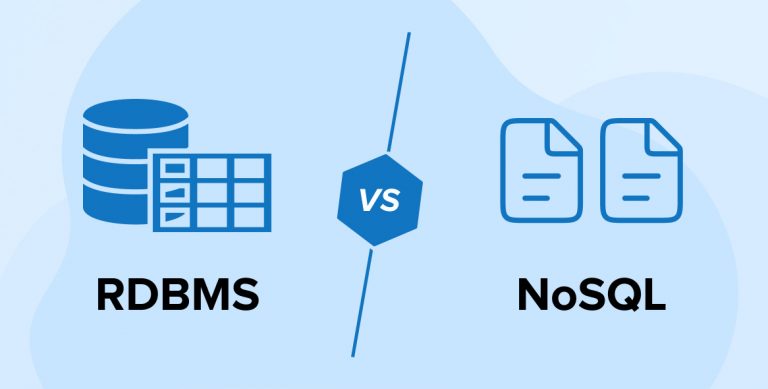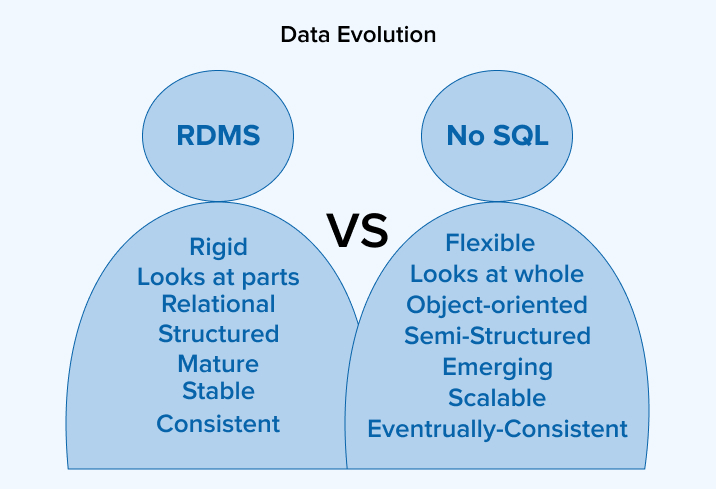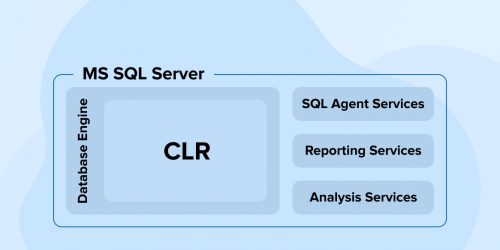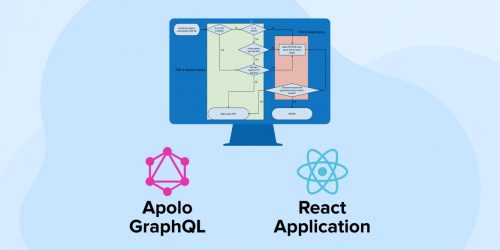Related Blogs

In today’s fast-paced business world, NoSQL is preferred compared to RDBMS. This is because NoSQL handles rapid change effectively than RDBMS, which simply are not designed to meet changes and challenges these days.
Data Evolution
Most articles on the NoSQL topic are around the theme of RDBMS vs NoSQL databases. NoSQL encompasses a huge array of different database technologies which were developed as a response to the demands presented in creating modern apps. Developers work with apps that build massive volumes of new, quickly changing data types, such as structured, semi-structured, unstructured and polymorphic data.
RDBMS means Relational Database Management System. The data is structured in database fields, tables and records. Each RDBMS table has database table rows. Each and every database table row contains one or more database table fields. There are very good reasons for opting for an RDBMS so long as the amount of data isn’t prohibitive. Nonetheless, there are also specific and simple reasons why traditional RDBMS solutions could not scale beyond some database nodes and that is painful even. So, one has to decide when and why one should opt for RDBMS.

Structured or Unstructured?
Although data durability is a vital aspect of an RDBMS, it isn’t a differentiator in comparison to other solutions. The nature of RDBMS is table based, it’s not a real feature but a way of storing data. While there are instances that could benefit from this, most of them are simple, similar to excel spreadsheets. However, that nature needs a relational concept between tables and rows to make up complex entities. These days, change happens frequently, and data modeling is a big challenge due to the time and resources that a relational database will require. Sadly, when using a relational database, even a straightforward change such as adding or replacing a column in a table could become a million dollar task.
From CIOs to developers, everyone has realized that RDBMS simply were not designed for the challenges in today’s data. Thus, there has been an explosion of data as well as new database products on the market recently. Every year, the list just gets bigger and bigger. As a matter of fact, the trend has been going on for several years now.
Digital Economy
The business environment is undergoing enormous change as industry after industry is shifting to the Digital Economy. It is an economy powered by the web as well as other 21st century technologies, including the social, mobile, analytics, cloud, and big data, popularly termed as SMAC. At the center of every Digital Economy business is its web, mobile, and Internet of Things apps. They are the primary way that organizations interact with clients and how they run more and more of their businesses. The experiences that businesses deliver through those applications hugely determine the satisfaction and the loyalty of their clientele.
Birth of RDBMS and NoSQL
Relational databases were born during a time of business applications and mainframes, long before the internet, big data, cloud, mobile, and the Digital Economy. As a matter of fact, the first commercial implementation was released in 1979 by Oracle. The databases were engineered to run on one server, thus, the bigger, the better. The only way to boost the capacity of the databases was to update the servers, such as the processors, storage, and memory to scale up.
The emergence of NoSQL stems from the exponential growth and rise of the Internet and of web apps. Google released BigTable research in the year 2006 and Amazon released Dynamo research paper in the following year. The databases were developed to meet the new generation of business requirements.
Agility
RDBMS are the main roadblock to agility because they do not very well support agile development because of their fixed data model. But with NoSQL, a business could develop apps with agility. As innovation centers around the development of contemporary web, mobile and the internet of things applications, developers now more than ever needs to develop faster applications and services. Speed is paramount, but so is agility because these apps evolve far more quickly compared to legacy applications like ERP.
NoSQL databases support data storing as is. The big majority of data in an enterprise system is unstructured. Most NoSQL databases could handle indexing of unstructured text as either a native feature or an integrated set of services. Being able to manage unstructured text increases information and could help businesses make better decisions. For instance, advanced users include support for numerous languages with facetted search, word-stemming and snippet functionality support. Advanced features also have support for dictionaries and thesaurus. Additionally, using search alert actions on data ingest, one could extract named entities from directories like those listing places, people, and organizations, that allow text data to be categorized, tagged and searched better.
Schema Agnostic
The schema agnostic feature of NoSQL databases allow for handling change over time. They are very much capable of handling change and there is now need to rewrite ETL routines if the XML message structure between the systems change. Some NoSQL databases even take this step further and offer a universal index for the structure as well as text found in information.
Who’s Using It?
There are several Global 2000 organizations deploying NoSQL for mission critical apps which have been discussed recently. One example is Europe’s number one retailer, Tesco. It deploys NoSQL for eCommerce, product catalog and other apps. Another example is Ryanair, the busiest airline in the world that uses NoSQL to power its mobile application that serves more than three million users. Marriot also deploys NoSQL for its reservation system which books $38 billion yearly. These are just a few of the enterprise in the world that make use of the NoSQL platform.
NoSQL Types
The various types of NoSQL are key-value, columnar, document and graph. Key-value databases fit well with apps that frequently have small reads and writes together with simple data models. The stored values in key-value databases could be simple scalar values, like integers or Booleans, but they could be structured types of data, like lists and JSON structures. In general, key-value databases have simple query facilities which allow for looking up a value by its key. Some databases support search features that provide for seemingly more flexibility. Another type is the columnar or column family databases which are designed for huge volumes of data, high availability and read and write performance. An example is Google introduced Bigtable to meet the needs of its service. Facebook developed Cassandra in order to back its Inbox Search service. These databases run on multiple servers clusters.
The document type databases offer an alternative to relational databases rather than being a replacement. Each has its place and they provide more options to choose from. One particular example is MongoDb documentation that talks about a pattern that’s known as Array of Ancestors that hastens up access to related data when joining documents. The fourth type is the graph database. It uses graph structures for semantic queries with edges, nodes, and properties to store and represent data. A key concept is a graph, which relates data items directly in the store. Examples include Neo4j, AllegroGraph, and others.
There’s no doubt that NoSQL offers multiple benefits for the development of next generation of applications in the era of Big Data. The new applications, use cases, and data needs have many times outgrown the legacy RDBMS model and require a different type of engine, which are fulfilled by NoSQL.

Vishal Shah
Vishal Shah has an extensive understanding of multiple application development frameworks and holds an upper hand with newer trends in order to strive and thrive in the dynamic market. He has nurtured his managerial growth in both technical and business aspects and gives his expertise through his blog posts.
Related Service
Custom Software Development
Know more about software development services
Learn moreSubscribe to our Newsletter
Signup for our newsletter and join 2700+ global business executives and technology experts to receive handpicked industry insights and latest news
Build your Team
Want to Hire Skilled Developers?




Comments
Leave a message...